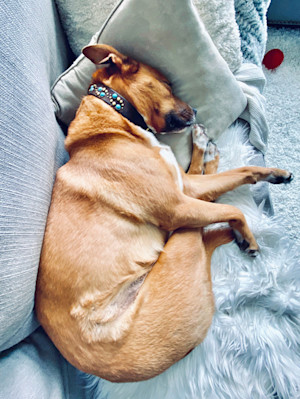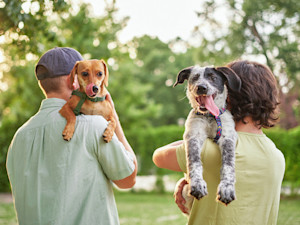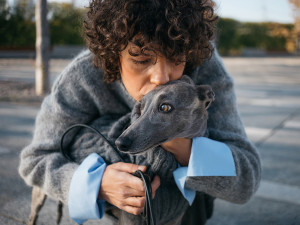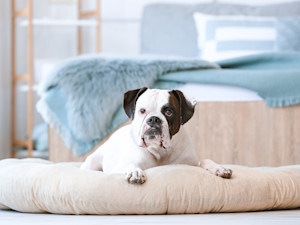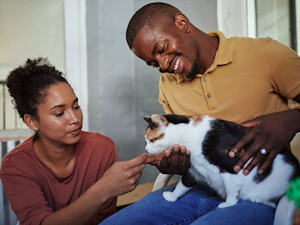Why Does Your Dog Steal Your Spot the Second You Get Up?
The science behind spot-stealing behaviour
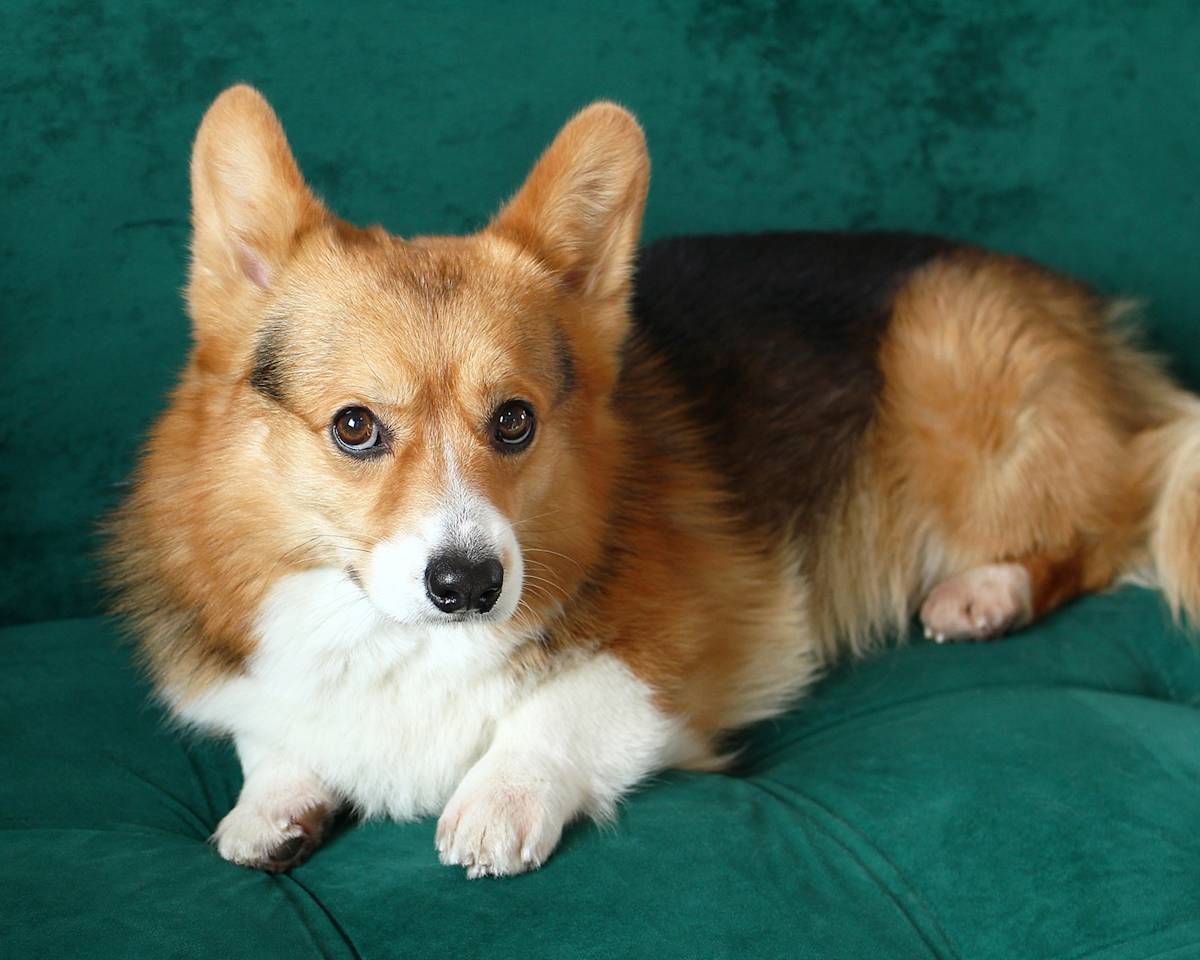
Share Article
Picture the scene: you get up to make a cup of tea, come back after just a few minutes and your dog is lying in your spot on the sofa like they’ve always been there. Adorable? Yes. Infuriating? Also yes. But why do they do it?
“The nub and gist of it is dogs can’t steal,” explains clinical animal behaviourist Emily Birchopens in new tab. Stealing “is a human concept” whereas “dogs just do things in the moment. They can’t understand ownership.”

Get (totally free) deals for food, treats, accessories, tech and way more pet parenting must-haves.
Alright, so your dog might not be knowingly committing themselves to a life of crime, but there are still plenty of reasons why your dog may favour your spot. From comfort-seeking to resource guarding, here are the most common ones and a few tips on what you can do if it bothers you.
8 reasons why your dog is obsessed with stealing your spot
1. Your dog loves your scent
Dogs see the world through their nose, and the familiar scent of their human parent can help them feel safe. If you have a favourite spot on the sofa, your scent will be all over it. So it only makes sense that your dog may choose that exact place to curl up and sleep in when you’ve left the area. It may also explain why they love to nab your place in the bed too!
2. Seeking warmth and comfort
“With all behaviour, we often have to think that the simplest answer is probably right,” says Emily. “So on that basis, they likely sit in your space once you’re up because it’s warm and smells familiar and nice.”
Granted, warmth may be more of a factor in the colder months when we’re all looking to feel a little cosier. But on a warmer day, they may choose the spot that gets the most sun. And if you like a bit of sunbathing too, you’re both going to want the same seat.
Alternatively, your dog might have simply clocked that where you sit is the comfiest place in the house. After all, those deep cushions you can fall asleep on are probably why you chose it in the first place! And as Emily points out, “our sofas and beds are so much more supportive than the average dog bed.”
3. Pack hierarchy and dominance
The term ‘dominance’ is widely misused when it comes to dogs. Many think that their dog is trying to rule the roost and they need to show them who’s the leader of the pack, even though the dominance theory has been debunkedopens in new tab.
Scientifically, dominance just means a relationship between two or more individuals where one may get preferential access to certain resources at certain times. So, one dog may peacefully allow another dog to sleep in the best spot, but that dog may then get first dibs when it comes to toys. It’s all about give and take; not a strict hierarchy.
When it comes to dogs and people though, your dog isn’t trying to be ‘alpha’ if they steal your spot. It’s going to be one of the other (probably more obvious) reasons you’ve already been reading about.
4. Separation anxiety
“Dogs commonly rest on pet parents’ clothing and beds when they’re left home alone as a way of feeling safe and comfortable,” says Emily.
This doesn’t necessarily mean that your dog has a separation problem so you’ll need to look out for other signs, such as vocalisation when they’re left, destruction or toileting inside the house. Some dogs, though, can be quite stoic. They may not seem to outwardly panic but don’t look relaxed either and may not be able to sleep.
If you’re concerned, invest in a camera to see how your dog acts when left. You can then get in touch with an accredited behaviourist to come up with a plan on how to help them feel better.
5. Claiming the best spot in the house
We’ve talked about your spot potentially being the comfiest. But what are some other reasons dogs may see it as the best place to be in the house?
Well, dogs can show territorial behaviour. So, if your spot’s near a window where they get a great view of the neighbourhood comings and goings, they may well opt for it as soon as they get the chance. (You can likely tell if this is the case for your dog if they bark at things they see out the window or simply love to look out of it.)
The same might apply if it gives a good view of the room they’re in and any other pets or people that might be in it. It’s also possible that they’re just curious as to why you always sit there and want to see what’s going on when you leave.
As Jeanette Muldoonopens in new tab, an IMDTB-accredited behaviourist, explains: “If a dog isn’t able to get up on the sofa when they’re young and the owners have spent time making sure they stay off, getting onto the sofa may be exciting. Therefore, they may take any opportunity they can to get up on the sofa.”
6. Attention-seeking behaviour
Of course, it’s possible that your dog could be attention-seeking when they nab your place. While Emily says this behaviour is “very unlikely to be attention-seeking,” Jeanette explains that if your dog “moving into your spot gets your attention or if it has been reinforced in any way through a pet parent smiling or laughing at them, then it could be that they enjoy doing it to elicit a reaction.”
Even if you often try to get them to move or sound a bit frustrated at times, this can still be viewed as a form of valuable attention by some dogs. And if you try to lure them away with treats or toys, you may have turned spot-stealing into the best game ever!
If you think this could be your dog, it’s worth considering whether they get enough attention from you throughout the day. A bit of extra quality time could make a big difference.
7. Habit and routine
Dogs are creatures of habit – a bit like some of us! The more they practise something, the more likely they are to keep doing that thing. Eventually, it’ll become a solid habit that can be difficult to change.
You can also see how powerful habits are if your dog has a favourite spot on the sofa that a person accidentally steals. My dog, who religiously relaxes on the same seat every day, will stand in front of a visitor who dares to sit in his spot, staring at them until they move. Works a treat every time!
8. Resource guarding
If a dog starts growling when you approach them, they could be resource guarding their resting place, says Emily. “But it’s much more likely that they know you’re going to move them, they’re comfy and warm, and they don’t want to move so they’re giving you the canine version of ‘please leave me alone’.”
According to Jeanette, other signs your dog could be resource guarding include:
Going stiff when approached.
Whites of their eyes being visible.
Escalating to growling, snarling, snapping and even biting.
Is it normal for dogs to steal your spot?
Dogs do what works for them. So if they achieve something by nabbing your place – whether that’s to feel more comfortable or more secure – they’re going to keep doing it. And that’s normal.
It’s not an issue unless your dog is showing aggressive behaviours or you’re bothered that you’re left without anywhere to sit!
How to stop your dog from stealing your spot
Training techniques that work
An easy way to stop your dog stealing your spot is to “give them a ‘stay’ cue when you get up so they don’t move over,” says Emily. “Or when you get back, call them into their space again and reward them for doing so.”
Avoid anything that involves you physically trying to move your dog as this can cause conflict and may lead to your dog viewing you as a threat. Hands-off is always best when it comes to dog training.
Note: if you believe your dog may be resource guarding, you’ll need to work with an accredited behaviourist to avoid the problem escalating. They will work alongside your vet as medical issues and underlying pain can also contribute to these kinds of behavioural issues in some cases.
Creating boundaries
While training your dog to stay in their own place, you may want to prevent access to where you usually sit. This will mean they can’t practise the behaviour you don’t want and make it easier for them to do the behaviour you do want.
You can do this kindly by covering up your seat with something when you get up. Ideally, this won’t be something comfortable they’ll want to lay on like a cushion! You could use something bulky like a little stool, for example.
And if you don’t want your dog on the sofa at all, you’ll need to block access to it. This may involve putting a pen around the sofa in the short term and can often be easier than penning your dog into a small space they don’t want to be in.
Providing alternative comfort spots
If you want your dog to rest elsewhere, you’ve got to make it worth their while. The cold, hard floor isn’t going to compete with the soft, snuggly sofa. But you can create their own sofa by giving them a couple of comfy beds to choose from and putting lots of great things on those beds such as chews so they’re more inclined to go there.
Remember every dog’s an individual so you may need to play around to see what your dog prefers. Some may want more blankets to burrow under while others may want a space that’s big enough for them to stretch out.
You can even train them to go to these places, explains Jeanette, by rewarding them initially for any interaction with the bed using food. Slowly increase the gap between rewards until they can settle there for a decent duration.
When spot-stealing becomes a problem
When should you worry about your dog stealing your spot? Well, if your dog is showing any sign of aggression such as growling, snapping or biting when they’re approached in that particular spot, that’s a sign you need to get professional help.
You may also want to look at changing the behaviour if it’s simply becoming a nuisance for you when you get up to make a cuppa and come back to find yourself relegated to the floor.
Frequently asked questions: why does my dog steal my spot?
Is it normal for my dog to steal my spot every time I get up?
Not all dogs will do this. But if your dog’s stealing your spot, they’re doing it for a reason. That may range from simply wanting to be more comfortable to wanting to be close to your scent. And they’re all completely normal.
How can I tell if my dog is being dominant or just affectionate when stealing my spot?
Look at their body language – do they want to get closer to you and engage with you? Or are they telling you to go away?
Even if it’s the latter, you don’t need to worry about them being dominant as that way of thinking was debunkedopens in new tab a long time ago. A dog who may show aggression in this particular situation isn’t trying to take over the house. In fact, they may be feeling worried by people approaching.
Will letting my dog steal my spot make them think they’re the boss?
Absolutely not. Dogs don’t live in a strict hierarchy as some people think and aren’t vying to be anyone’s boss. They’re a member of your family and want to live cooperatively with you. If they’re not doing that, that’s a sign they’re struggling and need some support via a professional.
Why does my dog only steal my spot, not my partner’s?
There could be a couple of reasons to explain this and it’s not as simple as dog favouritism.
One: where you sit is simply more comfortable for them than where your partner tends to sit.
Two: they’re more attached to you and therefore want to be closer to you (or your scent). This doesn’t mean they prefer you over your partner. Strong bonds can arise with people who do more with their dogs, including the basics like feeding, or who simply are around more.
Three: your reaction is encouraging them to do this. For example, if you give them a big fuss when you come back, they may enjoy this and look to steal your spot again.
How do I stop my dog from stealing my spot without being mean?
Firstly, make sure they have a comfortable place to rest. Make it the best place ever. Then prevent access to your spot by blocking it off or covering it up temporarily.
Finally, teach them what you’d like them to do instead. This could be strengthening your ‘stay’ cue or teaching them to go to their bed on cue. You can also teach them a way to move off your spot if they do go there – perhaps by recalling them.
For the best results, all of this should be done using positive methods such as giving them treats when they do the behaviour you’re looking for.
Is spot-stealing worse in certain dog breeds?
“I haven’t heard of any breed being more likely to do it than any other,” notes Emily. But if there were dog breeds that could be more prone to it, it’d likely be “those who are heat-seeking ninjas” such as Whippets and single-coated breeds.
It’s also possible that dogs bred to be close to humans such as lapdogs may be more likely to show this behaviour.
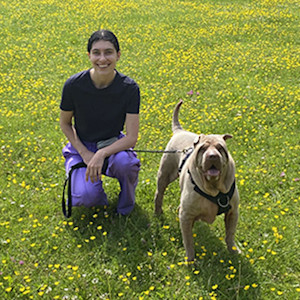
Lauren Sharkey
Lauren Sharkey is a journalist-turned-dog behaviourist who runs Winnie’s Worldopens in new tab: a training and behavioural company that aims to give dogs and their pet parents the life they deserve. She shares her life with a Shar Pei named Winston, who is the inspiration for her career change along with being her biggest love (and challenge!).
Related articles
![picture of a dog sleeping in a shrimp position]()
What Is ‘Shrimping’ and Why Do Dogs and Cats Do It?
Learn all about this frankly adorable behaviour
![two people hold dogs over their shoulders]()
How to Raise Your Dog in a Shared Living Space, From Roommates Who Know
From sharing a rented pad to sharing pup responsibilities...
How to Tell If Your Dog Is a Hugger – Or Not
Boundaries, folks. Boundaries
![]()
Snooze In Style: The Best Dog Beds For Even The Fussiest of Pups
They might prefer to sleep with us, but these trainer-recommended dog beds are the next best thing
![Pet parent comforting anxious dog by holding their paw]()
8 Tips for Helping an Anxious Dog
Easy ways to calm your pup’s nerves
![Couple with a cat]()
Our Pet Loves Me But Ignores My Partner – What Can the ‘Spare Human’ Do?
Spare human syndrome? Here’s how to win your pet’s love
